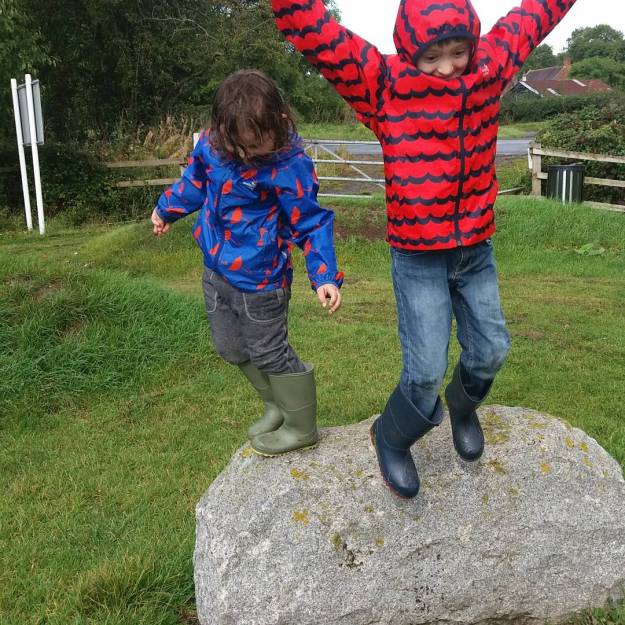Our household, like many in WEIRD (Western Educated Industrialised Rich Developed) world, is a household of screens. My husband and I have smartphones, we have a television, an iMac and a laptop. The boys and I have Kindle Fires and there are a couple of iPads that husband pinched from work. Some would suggest that is excessive, and the part of me that embraces minimalism would agree. My cleaner is shocked that we only have one television (when he hears of one going cheap he tries to persuade me to ‘rescue’ it!) However, it works for us. The boys use their Kindles or the iPads or watch television as and when they wish. They watch films, documentaries and Youtube clips, and look things up on Google. They play games like Minecraft, Lego Lord of the Rings and Cut the Rope. They use educational apps and look at ebooks, they use the word processor to type. Their use of the screens we have is rich and varied, and I am satisfied with the way they are used and how much. My level of satisfaction has gone through a long process to get to where it is today, however.

When Little Bear was nearly two he had a fascination with buttons that lead to him turning every switch he could reach on and off and on and off and on and off… ad infinitum. One day the television button just could take it any longer, and with a small puff of smoke and a slightly frazzled smell it blew. We looked at some new televisions, but we were incredibly low on funds, and amid much reading about how damaging screens can be to young brains, I decided we wouldn’t replace it. It seemed the perfect way to avoid the digital babysitter so many articles were warning me against.
Then I got pregnant, complete with hyperemesis and searing pains in my joints. Running after a boisterous toddler became harder and harder, and I found myself placing an iPad in his hands more times than I was happy with. He loved this new tool, and very quickly picked up how to use it to do whatever he needed, and I sat back feeling queasy, relieved and concerned in equal measures. The iPad became well-used after Baby Teddy’s arrival as well, occupying Little Bear when the baby needed feeding, or those days when he just needed constant cuddling. Again I was relieved to be able to fall back on this convenient tool, but as the haze of tiredness lifted my concerns increased. And so I began to read and ask questions.
The concerns people have with ‘screen time’ for children tend to fall into four categories: generational concerns; an adult need to retain control; health concerns; and content concerns. Each of these ultimately develop from a place of fear, the antithesis of happiness, and so I have tried to unpick those ideas in an attempt to show how I have reached mutual satisfaction with screens for our family.
Generational concerns
Every generation throughout history has decried the state of the younger generation at some point. And every generation has its own media to blame. Plato called on a ban on poetry for children, claiming that it lead to quarrels and fighting.
In the 1700s, with the invention of the printing press, “The free access which many young people have to romances, novels and plays has poisoned the mind and corrupted the morals of many a promising youth; and prevented others from improving their minds in useful knowledge.” (Reverend E Hitchcock: Memoirs of the Bloomsgrove Family).
The 1980s saw an outcry against the television, amid claims the flickering screen caused behavioural disorders. The 1990s was the era that suggested that violent films and games caused young people to behave violently themselves.
Usually these concerns arise due to a lack or knowledge and understanding of this new media. Young people, and children in particular, have minds that are ready and open to new learning, subconsciously recognising the importance of new media and technologies to their later success. They learn quickly how to access the new media and use it proficiently, whilst the older generation are left behind. How many readers remember the frustration of watching their parents trying to work the video player?
I am reminded of a conversation I had with another parent at our forest school group. She was surprised and slightly taken aback that the children had access to books, and explained to me that she ensured her six year old did not look at any books yet for fear that it would prevent the full development of his imagination. Nor did she read to him, she told him stories and encouraged him to create his own. Does the idea of keeping your child away from books shock you a little? Would you be concerned if your child spent two to four hours (or more) a day reading? Why is this different from spending two to four hours (or more) a day on Minecraft?

Disclaimer: Although I am generalising, I do want to point out that not every member of the older generation is adverse to new media. My husband spent many hours as a child watching films with his Grandad. It was my Mum, my children’s Nana, who encouraged us to get a new television because she felt it was an important part of modern culture. My Dad is a known computer geek, and has had a computer since before I was born. It is within us all to move past this fear of the unknown and learn something new.
Adult need for control
We were at a park the other day, and another group was preparing to leave. Or at least, the adults were preparing to leave, the children had other ideas and were doing their best to ignore their parents’ calls to come. Eventually one mum said “You need to come now or you will lose your iPads for the rest of today.” Immediately all the children jumped off the climbing frame and ran to the adults, ready to go.
It is culturally normal for parents to find ways to exert control over their children, but that doesn’t mean it is right. It is usually done from a place of love (“as an adult I know what is best; I am keeping them safe”). However, it ultimately only teaches them that you do not trust them, and they therefore cannot trust themselves.
Back when I was struggling with pregnancy and a new baby, I used the iPad in this way. I knew it would keep Little Bear quiet and in one place, so it became a tool for me to control him with. When I was ready for him to play in other ways again, I would take it away. His knowledge that it would be removed again quite soon meant that I could rely on it occupying him for as long as I needed whenever I needed. At the same time I believed I was protecting his brain development, ensuring he got what I thought he needed instead of supporting him to find what he truly needed. As I learned more about unschooling and respect for children, I wanted to relax those limits on screen time and put my trust in my children knowing they have a much better sense than I do about what they need.
Many parents believe that if their child had unlimited access to tv, tablets and games consoles they would never choose to do anything else. Maybe this seems to be true with a child that is constantly asking is it four o’clock yet so they can put the television on. But this is A child that know s/he gets only two or three previous hours of screens before bedtime, when they may also plead for just give more minutes. A child who know s/he can use their tablet whenever they want for however long they want is not fearful they will miss out on something, and will feel free to choose something else if they wish.
A note here about self-regulation, a phenomenon you may hear a lot if you are currently learning more about trusting your child in their learning and development. The key part of the phrase is ‘self’. Allowing your child unlimited access to screens for long enough does not mean that eventually they will only use screens as much as you feel is appropriate. (Nor does unlimited screen time mean your child will always be behind a screen). It means they will find a balance that they are happy with. sometimes, for a parents, that can feel too long and too much. However, I find that if I take an interest in what the boys are doing, I can find understanding and acceptance in their current interests, and with that understanding i can let them continue with their choices.
My aim is that my children learn to use screens as just part of their arsenal tools as they grow up. Sometimes this means Teddy needs to watch Wallace and Gromit go to the moon six times in a row, or Little Bear spends a whole day building an underground dinosaur skeleton on Minecraft.
Health concerns
A major worry parents have about screen use tends to be around their children’s health. There seem to be a plethora of articles blaming childhood obesity on screens; children’s difficulty with sleeping on blue light from screens; violent behaviour on violent video games. Screen use is cited as addictive with sensationalist language such as “digital heroin” ramping up the fear.
Despite these many articles, I could find no decisive evidence for any of these concerns. Most new tablets no longer emit the kind of blue light that is considered conducive to sleep difficulties, and there are many apps and adaptations that can be used. Some studies have found that children who play video games are actually less likely to be overweight and tend to play outside more than children who don’t play video games. There is even a possible correlation between the rise in video gaming and a decline in violent crime worldwide.
The fear of addiction is possibly the health concern that worries parents most. Most of us know how easy it is to lose track of time whilst browsing Facebook, or to get distracted by slideshows and articles when we were only going to check our email. It is important to remember that humans like to repeat and continue anything that gives our brains that hit of pleasure, be it social media, chocolate or that new series you’re desperate to continue watching. That does not mean that we, or our children, are going to fall into the pit of addiction.
Robert Weiss suggests that the opposite of addiction is connection, and this is of great importance in our unschooling journey. Adults who have grown up with good attachment with their parents tend not to be susceptible to addiction. A large part of rehabilitation for former addicts is to learn to forge and maintain close and supportive social attachments.My main aim has always been to promote connection within my little family, and this is what keeps us from getting trapped in a whirlpool of screentime. Our close connections mean we can talk about when I feel the screens are taking over, and know that my children will listen without fearing i will just take their tools away. I respect their ideas and opinions and they respect mine. We don’t always agree, but we can usually compromise. The attachments we forge through mutual respect and care for each other will protect them now and into their futures.
Content concerns
Worries about the content of what our children consume onscreen are often in parents’ minds. This can range from concerns that there is not value in playing ‘silly’ games, that advertising is warping our children’s wants, to avoidance of content that is pornographic or nightmare inducing.
One of Teddy’s favourite games at the moment is Pacman. Many would wonder what he could be getting out of such a repetitive, two dimensional game that seems the opposite of creative. However, I know there is something that he is learning from it, or he would not keep returning to it. He has had his Dad draw a range of Pacman characters, and enjoys arranging them on the floor. He spent a long time watching other people playing (the rest of us were bored a lot more quickly than he was!) and now practises playing himself. Perhaps he is learning about direction, or speeding up his reactions, or using his peripheral vision to avoid the ghosts. I am not sure. But I trust that he knows what he needs and I will continue to support his ‘silly’ game play. Peter Grey also discusses the benefits of video gaming here.
Advertising to children is a big deal. Companies know the power of pestering very well, and are not adverse to using that to make some money. As parents, our first instincts may be to avoid anything that may include adverts: if our children’t know that that colour-change car or walking talking doll exists they won’t think they want one. But how will they learn to recognise and unpick advertising messages when they meet it later in life? Childhood, when brains are ripe for learning, is an excellent time to talk about how companies try to part us from our money. Children who watch and discuss advertising quickly learn to analyse when they are being persuaded to follow an idea and work out if it is what they truly want.
It is important to handle pornographic or scary content in a similar way. Sooner or later your child is going to see something they, or you, wish they hadn’t. There are plenty of measures you can put in place to protect them (kids Youtube, kids search engines, age limits on Netflix, etc) and I am absolutely pro using those protections. However, sometimes things slip through, or your child reaches an age where those protections seem inappropriate. This is, again, where connection and mutual respect is so vital. If your child does not have to hide their screen use, and has not been made to feel they are not using screens ‘right’, then they are much more likely to come and talk about what they have seen. My children know I support their choices on screen use, I am not going to be angry or say that they should not have been doing something. Little Bear already confidently discusses concerns he has in other areas of his life, so I am certain he and his brother will do so around screens as well.
Of course, it is right for every family to approach screen use in their own way. However, whatever approach you take, children are going to discover and make use of screens based media at some point and in some way. I am hoping that allowing my children unlimited access (with protection in place against the worst that is out there) will give them ample chance to set their own limits as they explore. Their tablets are not a treat that I control, television is not available only at certain times of day to watch only certain programmes. Screens, for my children, are simply one of a range of tools they use to discover and explore the world and their ideas.

 I always enjoyed the half term before Christmas as a teacher. The children would arrive on the first week back after the break all ready for Halloween and then bonfire night, and then the run up to Christmas would begin. I love all things glittery (fireworks pictures and Christmas decorations), and I loved the build up of excitement and happiness I saw in the children I taught. It was a time of year when we relaxed the demands of the curriculum a little in order to rehearse songs and lines for the Christmas performance, as well as finding time to decorate the classroom, hand out Christmas cards and plan a Christmas party.
I always enjoyed the half term before Christmas as a teacher. The children would arrive on the first week back after the break all ready for Halloween and then bonfire night, and then the run up to Christmas would begin. I love all things glittery (fireworks pictures and Christmas decorations), and I loved the build up of excitement and happiness I saw in the children I taught. It was a time of year when we relaxed the demands of the curriculum a little in order to rehearse songs and lines for the Christmas performance, as well as finding time to decorate the classroom, hand out Christmas cards and plan a Christmas party.
